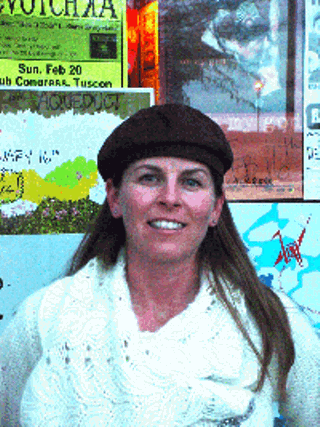You've got Sherman Alexie coming to town next week.
We do. It's gonna be a really special event, because Sherman is essentially donating his time to us. That gives us a fund-raising opportunity to boost the health of the Tucson Poetry Festival.
How can people meet with Sherman while he's in town next week?
They can do that in one of four ways, or maybe all of four ways, which would be the best for the participant and the festival. We're going to screen Sherman's latest film, The Business of Fancydancing, at the Screening Room on Thursday, Feb. 17, and Sherman will be there for a Q&A following the film. We're hoping that will attract media-arts students and serve as a little precursor to the upcoming Arizona Film Festival. On Friday (Feb. 18), from noon to 2 p.m., anybody can go to a lunch reading and Q&A with Sherman at the Desert Diamond Casino in the banquet room--and maybe pull some slots or play some blackjack while they're there. Tickets are $25 for students with ID and $32 for adults. Friday evening will be the biggest event: We're going hold a reading and performance at Tucson High School, in the really beautiful auditorium, at 7:30 p.m. Tickets are $10 for students and $16 for adults. And then Saturday morning (Feb. 19), we'll finish up with a breakfast Q&A at the café at the Temple of Music and Art from 10 a.m. to noon. Tickets for that are $20 for students and $25 for adults.
What's going on with the Tucson Poetry Festival this year?
The first phase is in April, and that will include some out-of-town guests as well as the poetry slam and bilingual high school contest. Phase two will be in early October, and that will include the statewide poetry contest and more out-of-town guests. The whole year's programming explores poetry's relationship to painting. This is the third in a series of five festivals in which we're creating programming that celebrates and explores poetry's relationship to other forms of artistic expression. Last year was music, and the year before was film. Next year will be dance, and then we're going to do multi-media.
How are you keying into the painting theme?
There's a long history of ekphrastic poetry, which is poetry that's written in response to a painting. There's also a long history of poets and painters collaborating, writing and painting together. It started long ago, but we're interested in things that began in the 1950s. We're going to hopefully partner with the Tucson Museum of Art, as well as the Museum of Contemporary Art, to highlight local painters and writers as well as folks coming from out of town. So there will be a whole series of readings and workshops, each geared to represent a different aspect of the conversation between these different art forms.
Any special guests you're bringing in for the April event?
We're going to bring Sam Hamill. He just resigned as the much-beloved publisher of Copper Canyon Press, a really wonderful small poetry press. He's also come to fame recently because he created the largest anthology in history of Poets Against the War, which is dedicated to Laura Bush.
Because she pulled a plug on a poetry reading.
She pulled the plug on a reading, because she heard grumblings that hundreds of poets were coming, and they were going to read against the war and Bush.
Surprisingly, poets aren't all that hot on the whole war thing.
No. There's a long history of poets writing against war.
What is the current state of poetry here in Southern Arizona?
I think it's vital. It's continually surprising that there are lots of people in the audiences for everything from open mic to an appearance of the chairman of the National Endowment for the Arts. Lots of people came to that. There's good support and audience participation for virtually every poetry reading I go to in the city, and there's a lot going on. There's an open mic every night of the week in Tucson, and sometimes more than one.









